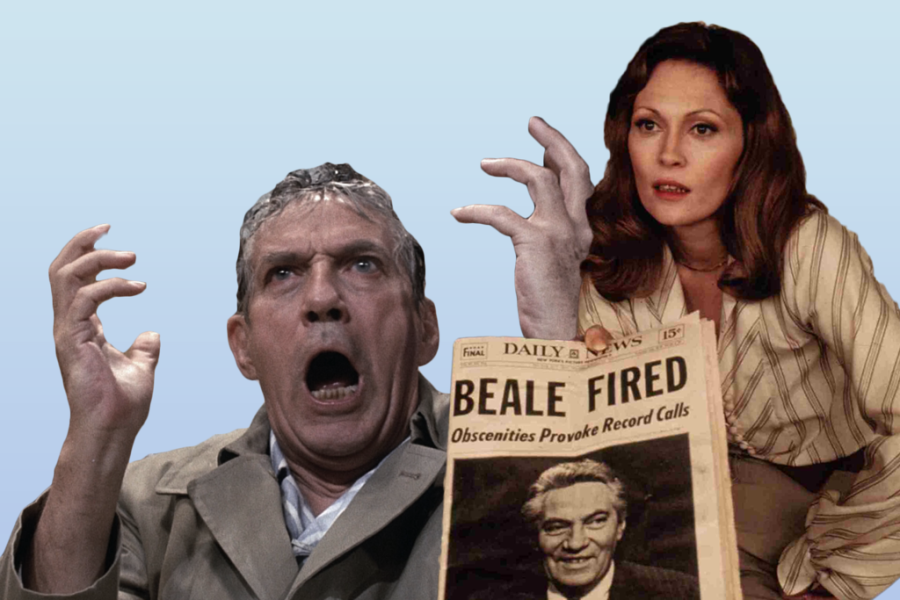REVIEW: The movie Network is a satire that turned out to be real
The movie Network follows a deranged news anchor and shows how modern media has headed in a less than journalistic direction.
November 27, 2021
The United States could’ve been arguably described as going through a rough patch in 1976. New York City had barely avoided bankruptcy and was facing financial trouble, the fall of Saigon and withdrawal of U.S. troops from Vietnam was still a fresh wound and on top of it all Watergate had just plummeted American trust in the government. The 70s were marked by instability and polarization, just like the modern political era. The 70s media had quite a bit of material, emotion and technology to work with.
“Network” is a satirical movie set and released in 1976, capturing this time of political and societal rupture. It follows the fictional news network UBS after they fire their evening news anchor Howard Beale (Peter Finch) due to low ratings.
Beale, who is incredibly distraught over this decision, declares on national television that he will kill himself during the next broadcast. Ratings then proceed to jump for the network, so instead of firing Beale, UBS gives him his own show as a pseudo-televangelist where he rants about the ills of modern life. The show is a hit and the network’s standards slip, all but throwing out their principles of journalism as the ratings continue to rise.
“The audience is asked to believe that people working inside the television oligopoly scheme to advance their corporate positions with such melodramatic abandon that their behavior constitutes not just an affront to traditional moral standards but clear and present danger to democratic society… even in post-Watergate America—where we know that bats can get loose in the corridors of power—it is just impossible to accept,” Richard Schickel, Time movie critic, said.
Unfortunately, Schickel’s review with 45 years of hindsight comes across as laughably naive. That’s because “Network” isn’t just a satirical movie anymore. It’s almost a sort of prophetic vision into the current state of broadcast news.
Many of the reviews from 1976 seem to argue on if the movie’s plot was even plausible. Sander Vanocur of The Courier-Journal didn’t exactly think of it as a film about television so much as a study of corporations willing to do anything for profit. Vincent Canby of The New York Times felt the film’s absurdities were, “the satirist’s cardiogram of the hidden heart, not just of television but also of the society that supports it.” Pauline Keal of The New Yorker hated it, but then again she seemed to find fault with just about everything.
However, by the movie’s 40th anniversary, many critics talked about how strikingly accurate the movie’s depiction of the news’ commodification was. Even in the five years since the 40th anniversary, the state of broadcast news has only become more uncanny to the movie.
Fox News, (owned by the Murdoch family, along with their other media conglomerate News Corp) which is sort of the nightmare come-to-life version of UBS, relies almost completely on an audience of emotionally driven baby boomers. Despite it’s questionable adherence to truth and longtime accusations of conservative bias, the network’s primetime show “Tucker Carlson Tonight” is currently the highest rated political commentary show, according to Nielsen. Although Carlson isn’t exactly a dead ringer for Howard Beale, I was still struck by how similar Beale’s serenading of the audience with fear-mongering was to Carlson’s style of evangelizing baby boomers with xenophobia. Both shows rely on anger and passion to top the ratings charts.
Both Howard Beale and Tucker Carlson’s shows are also plagued by legal troubles. Beale’s show is repeatedly sued by the FCC, investigated by the FBI and generally complained about (which only increases its popularity). Tucker Carlson’s brand of yelling false things on TV has also landed him in court. Carlson managed to avoid losing a lawsuit in 2020 through lawyers telling a judge that given Tucker Carlson’s reputation, you should never believe anything he says. Carlson’s behavior overall has proved that, in our modern media landscape, you can get away with anything as long as enough people are listening and you’ve garnered enough status.
My favorite character in the movie was Diane Christensen (Faye Dunaway), due to her absolute ruthlessness. Christensen’s whole life is her work and she is the incarnation of UBS. Even when she hooks up with former news anchor Max Schumacher (William Holden) she can only talk about ratings for the network and the numerous FCC lawsuits UBS has racked up. She coldly calculates the next move to increase ratings and is indifferent to human suffering or emotions in general. She can even recall the Nielsen numbers off the top of her head. It makes her fascinatingly evil, but somehow still plausible.
Christensen is the epitome and probably the first cyncial parody incarnation of a “girlboss feminist.” A woman whose feminism has been perverted for the purposes of corporation and capitalism so much so that it isn’t feminism anymore. This brand of feminism has become increasingly prevalent in recent years and only continues to skyrocket in part due to the empty greed of corporations.
Of course, not all of Network’s prophecies have come true. We’ve yet to see a news anchor be murdered by his news network for simply poor ratings. Enough of its cynicism over broadcast news’ allegiance to their conglomerates (which triumphs over their allegiance to the truth and integrity in reporting) does, however, ring true. Ultimately, “Network” is one of the most biting and politically astute satires because of its ability to capture the sorry state of the American distortion of truth 45 years later on.









